
Has multiculturalism failed?
With soldier being murdered in London, Paris; immigrants rioting in Stockholm, big question arises regarding western Europe's immigration policy, with some experts clearly stating 'it has backfired'
In Sweden, riots continue to plague the capital, with cars being set ablaze and uprisings spreading out from mainly poor immigrant areas in Stockholm. All these are prompting experts, politicians and citizens to wonder whether the European immigration policy a failure.
Related stories:
- UK's Cameron: Europe must wake up on extremism
- France's Sarkozy: Multiculturalism a failure
- Merkel: Multiculturalism failed miserably
In a country with a reputation of openness, tolerance and a model welfare system, the rioting in Sweden has exposed a fault-line between a well-off majority and a minority – often young people with immigrant backgrounds – who are poorly educated, cannot find work and feel pushed to the edge of society, an issue mirrored in many other European countries.
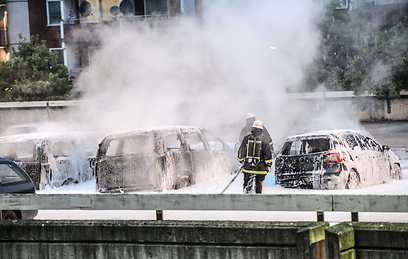
Riot aftermath. Stockholm (Photo: AFP)
"The generous Swedish immigration policy has backfired," Zvi Mazel, a fellow of the Jerusalem Center for Public Affairs, told Ynet. Mazel, Israel's former ambassador to Sweden, Romania and Egypt claims that the fact that Sweden was willing to accept any refugee has now been turned to its disadvantage.
"The Swedes have generous absorption stipends and financial aid for immigrants; they create a situation in which any new immigrant can live in the country for a long period without finding work. There are those – mostly Muslim – that do not wish to integrate into society, and prefer to live in ghettos at the fringe of the city," Mazel added.
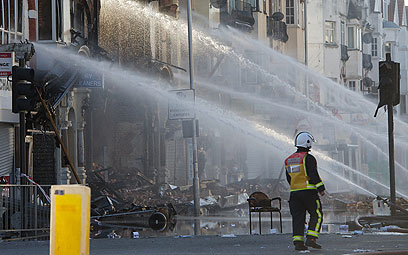
Policy gone wrong? (Photo: AFP)
"The Swedish immigration policy has completely collapsed. The Swedes thought they were assisting persecuted people to come to one of the most wonderful countries in the world in terms of welfare, but quickly found out they had a growing minority of Muslims (between 700,000 to 800,000) that are unwilling to assimilate into Swedish society despite all the incentives and benefits they received."
Mazel stressed that there are of course Muslims and immigrants from Arab countries that have found work and integrated into Swedish society. Nonetheless, he argued that the majority of these immigrants prefer to stay jobless and entrenched in their own culture, at times even joining the lines of Islamic organizations, some of which are radical.
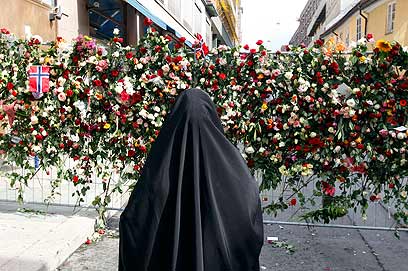
Oslo (Photo: Reuters)
According to Mazel, in addition to opening their gates to immigrants, over the last few years the Swedish government has initiated an employment program specifically focused on adults, offering them work-oriented education.
However, Mazel noted, the government quickly found out that only 15% of those who took part in the program successfully completed it and managed to find gainful employment.
'Important not to sully all Muslims'
"Europe's outlook on Muslims is flawed. The Swedes don’t understand that many of the immigrants currently living in Sweden are not interested in assimilating and integrating into society, but rather prefer to live within their own culture. They arrive without language or professional skills, and some of those who do find work, work at Islamic institutes and mosques where they're taught to hate," Mazel reiterated.
However, there are those who managed to find work and assimilate. It is important not to sully the entire group," Mazel said, adding that immigrants from eastern Europe – for example, from Poland – have successfully integrated into Swedish society, despite the fact that some of them have turned to crime and violence.
Against the backdrop of western Europe's struggle with the issue of disgruntled immigrants, who in the best case scenario turn to the streets to protest and in the worst case scenario turn to violence, a number of state leaders have voiced their concern on the subject – with some claiming that policy had failed and other just fanning the flames.
Multiculturalism
In March 2012, French President Nicolas Sarkozy declared multiculturalism a failure, saying there were too many immigrants in France and warning that the great number of immigrants might impede their ability to integrate into French society.
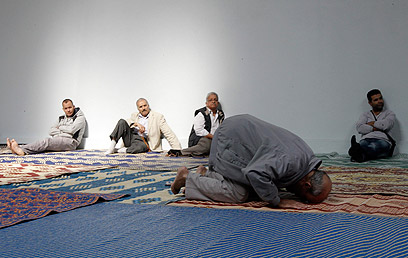
Muslim prayer. Paris (Photo: AP)
"It's a failure," Sarkozy said of multiculturalism. "The truth is that, in all our democracies, we've been too concerned about the identity of the new arrivals and not enough about the identity of the country receiving them. This raises the issue of Islam and our Muslim compatriots," he said.
"Our Muslim compatriots should be able to live and practice their religion like anyone else ... but it can only be a French Islam and not just an Islam in France."
Sarkozy further slammed French immigration authorities, saying they were collapsing under the burden of the huge number of immigrants, who are often left without work, education or housing. It is important to note that the comments were made during the height of France's presidential election, during which the incumbent Sarkozy attempted to attract right-wing voters away from the radical party La Penn.
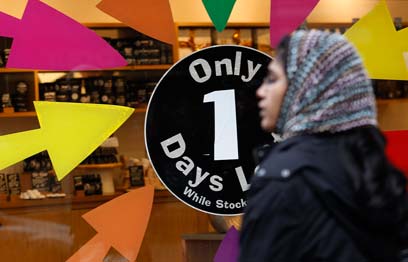
London (Photo: Reuters)
Just a number of days prior to Sarkozy's comments, British Prime Minister David Cameron made similar remarks. "We won't defeat terrorism simply by the actions we take outside our borders. Europe needs to wake up to what is happening in our own countries," Cameron said.
"We have tolerated these segregated communities behaving in ways that run counter to our values," Cameron added, saying "We have encouraged different cultures to live separate lives, apart from each other and the mainstream."
Cameron further noted that a culture of tolerance had allowed both Islamic extremists, and far-right extremists, to build support for their causes. "We've been too cautious, frankly even fearful, to stand up to them," he said, adding "If we are to defeat this threat, I believe it's time to turn the page on the failed policies of the past. Instead of ignoring this extremist ideology, we as governments and societies have got to confront it, in all its forms."
Both of these comments were made after German Chancellor Angela Merkel announced in 2010 that the multicultural model for integration in Germany had "miserably failed." At the time it was the first time Merkel expressed a clear position in an ongoing debate over the integration of immigrants – especially Muslims – into German society, stressing that the current situation must be changed.
According to Merkel, immigrants should be required to integrate in society, by committing to learn the German language – and not only be allowed to do so voluntarily, as has been the policy up until now.
Despite her criticism, however, Merkel stressed that Islam was an "integral" part of modern Germany.
- Receive Ynetnews updates directly to your desktop










